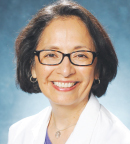AVERAGE-RISK women between the ages of 50 and 74 who have no symptoms of breast cancer should undergo breast cancer screening with mammography every other year, the American College of Physicians (ACP) has recommended in a new evidence-based guidance statement published by Qaseem et al in Annals of Internal Medicine.1 ACP’s guidance statement does not apply to patients with prior abnormal screening results or to higher-risk populations, such as women with a personal history of breast cancer or a genetic mutation known to increase the risk of breast cancer.

Ana María López, MD, MPH
“Beginning at age 40, average-risk women without symptoms should discuss with their physician the benefits, harms, and their personal preferences of breast cancer screening with mammography before the age of 50,” said ACP President Ana María López, MD, MPH. “The evidence shows that the best balance of benefits and harms for these women…is to undergo breast cancer screening with mammography every other year between the ages of 50 and 74.”
Rationale Behind Guidance Statement
EVERY-OTHER-YEAR mammography screening results in no significant difference in breast cancer mortality while substantially reducing screening harms compared with annual screening. Women screened annually receive more abnormal results that do not represent an actual breast cancer diagnosis than women screened every other year (7.0% vs 4.8%). These false-positive findings result in biopsies and surgeries that would otherwise not have been necessary.
About 20% of women diagnosed with breast cancer over a 10-year period will be overdiagnosed and likely overtreated. Therefore, finding this cancer is not of clinical benefit to the women. Harms of breast cancer screening include false-positive results, overdiagnosis, overtreatment, radiation exposure, and radiation-associated breast cancers and breast cancer deaths, as well as worry and distress from tests and procedures including breast biopsies.
In “Screening for Breast Cancer in Average-Risk Women,” the ACP reviewed guidelines from the American College of Radiology, the American Cancer Society, the American College of Obstetricians and Gynecologists, the Canadian Task Force on Preventive Health Care, the National Comprehensive Cancer Network®, the U.S. Preventive Services Task Force, and the World Health Organization. ■
DISCLOSURE: For full disclosures of the study authors, visit www.annals.org.
REFERENCE
1. Qaseem A, et al: Screening for breast cancer in average-risk women. Ann Intern Med. April 9, 2019 (early release online).

